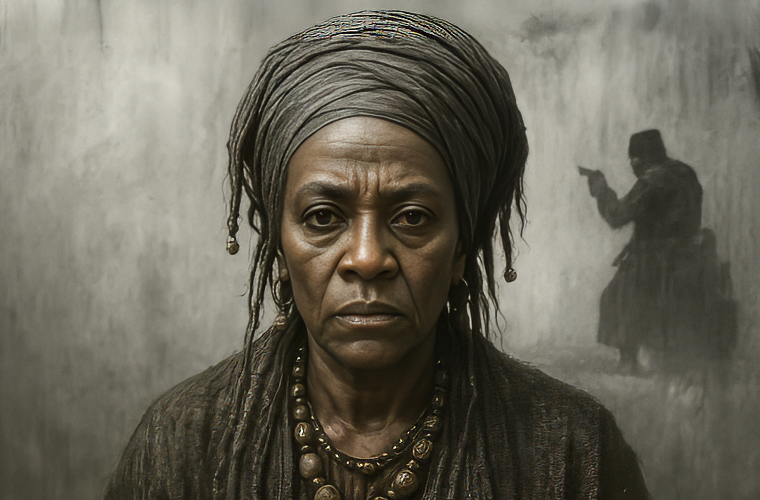In the mist-shrouded swamps of Louisiana, where cypress trees twist toward the sky and the air hums with secrets, lived Julia Brown, a voodoo priestess whose name still echoes through the ages. In the early 20th century, in the small, isolated town of Frenier on the murky shores of Lake Pontchartrain, Julia was a figure of awe, fear, and reverence. Her reputation as a healer, curse-weaver, and singer of haunting melodies spread far beyond the bayou, drawing whispers from New Orleans to the distant plantations.
Julia Brown was no ordinary woman. Her eyes, it was said, could peer into the soul, and her hands could mend broken bodies or summon misfortune with equal ease. The people of Frenier sought her out in times of desperation—when sickness clung to their kin, when love soured, or when unseen forces seemed to stalk their lives. Her remedies, brewed from roots, herbs, and whispered incantations, were legendary for their potency. Yet, her curses were equally feared, said to bind the fates of those who crossed her with unrelenting precision. Above all, it was her songs—otherworldly melodies that seemed to rise from the swamp itself—that marked her as a force beyond the mortal veil.
But the townspeople’s relationship with Julia was fraught with contradiction. They flocked to her doorstep when calamity struck, yet their gratitude was fleeting. To many, she was an outcast, a woman whose power they needed but whose presence they shunned. They whispered of her in hushed tones, their respect tinged with suspicion and fear. Julia, perceptive and proud, grew weary of their ingratitude. Her heart, once open to those who sought her aid, began to harden. The townspeople’s coldness sowed a seed of resentment in her soul, and whispers of her discontent began to circulate.
According to legend, Julia’s bitterness reached its zenith in 1915. Feeling betrayed by the community she had served, she vowed to make Frenier pay for its callousness. On the day of her death, as she lay on her deathbed, she is said to have sung a chilling prophecy, her voice carrying across the town like a storm cloud:
“When I die, I’ll take the whole town with me.”
Her words hung heavy in the air, a curse woven into song. On the day of her funeral, as mourners gathered and her coffin was lowered into the swampy earth, the sky darkened. A monstrous hurricane, born from the roiling Gulf of Mexico, descended upon Frenier with apocalyptic fury. Winds howled, tearing homes from their foundations. Lake Pontchartrain surged, swallowing streets and livelihoods. By the time the storm passed, Frenier was a ruin—its buildings reduced to splinters, its people scattered or lost to the floodwaters. The town was erased from the map, leaving behind only whispers and the legend of Julia Brown.
To this day, the story of Julia Brown is a tapestry of contradictions. Was she a vengeful sorceress who summoned the storm to exact her revenge? Some say her curse, called the hurricane, her spirit binding the elements to her will. They claim that on stormy nights, when thunder rolls over the swamps, her voice can still be heard—a spectral song weaving through the wind, warning or taunting those who dare to listen. Others paint a different portrait: a benevolent woman, misunderstood and mistreated, whose final song was not a curse but a desperate warning of the disaster she foresaw. In this telling, the townspeople’s refusal to heed her prophecy sealed their fate, and the hurricane was nature’s wrath, not hers.
The truth of Julia Brown’s life and legacy remains shrouded in mystery, much like the fog that clings to the Louisiana bayou. Was she a healer or a harbinger of doom? A villain or a visionary? No one can say for certain. What endures is the power of her story—a tale of magic, vengeance, and the thin veil between the living and the supernatural. In the quiet of the swamp, where the waters murmur and the cypress trees stand sentinel, Julia Brown’s legend lives on, as timeless and enigmatic as the land she called home.

